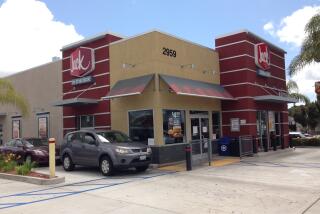Pillsbury Will Add Pet Inc. to Its Larder : Deals: The $2.6-billion acquisition is the latest evidence of consolidation in the food industry.
- Share via
British consumer products giant Grand Metropolitan said Monday that its Pillsbury division has agreed to buy Pet Inc. for $2.6 billion, furthering consolidation of the U.S. food industry.
The deal will give Pillsbury, perhaps best known for its cake mixes and cookie dough, a sizable presence in Mexican food products and ready-to-eat soups, two of the industry’s most promising growth areas.
St. Louis-based Pet is the leading marketer of Mexican foods, with its Old El Paso, Las Palmas and Pancho Villa brands. Analysts said Pet’s Progresso is the nation’s No. 2 canned soup label, behind Campbell.
Pillsbury will pay $26 a share for Pet’s stock in a tender offer expected to commence as early as Wednesday. The agreement has been approved by Pet’s board.
Analysts do not expect competing bids for Pet.
“This company has been shopped around,” said William Maguire, an analyst with Merrill Lynch in New York. “I don’t see anyone else stepping forward.”
Pet’s shares soared $5.375 in trading Monday on the New York Stock Exchange, closing at $25.50.
The deal is the latest evidence of consolidation in the food industry, as companies cope with sluggish overall sales growth. In November, Campbell Soup Co. paid $1.12 billion to buy Pace Food Ltd., the nation’s No. 2 Mexican food company. Before that, Pillsbury sold its Alpo pet foods division to Nestle, which already owned Mighty Dog dog food and Friskies cat food.
County Natwest Securities analysts Michael J. Branca and Mitchell J. Speiser said the Pet deal may fuel takeover speculation in other food industry companies, such as Heinz, Quaker Oats and CPC International, maker of Best Foods mayonnaise and Skippy peanut butter.
Pet’s board agreed to sell the company after overseeing a corporate realignment. In 1993, the company sold its Whitman’s Chocolates unit as well as its interest in AB Estrella, a manufacturer and marketer of snack foods in Scandinavia. In 1994, Pet sold its refrigerated-food businesses. Last year, Pet sold Hain Pure Food, a health food business.
Its restructuring paid off in the fiscal year ended in June, when the company reported strong gains in both its Progresso soup and Mexican food lines. Those businesses accounted for more than half of Pet’s $222-million operating profit last year, PaineWebber analyst Roger Spencer said. Pet had sales of $1.6 billion for the fiscal year.
The company lost ground in the three months ended Sept. 30 because of heavy discounting by competitors. Year-to-year sales of Mexican foods fell 5% during the quarter, while soup sales expanded 5.3%.
Analysts say Pillsbury has the marketing and financial muscle to help Pet regain its edge and combat such formidable competitors as Campbell in its key lines. They speculated that Pillsbury might sell off some less-promising Pet brands, such as Van de Kamp frozen fish and Downyflake waffles. Representatives of Pillsbury would not comment on its plans for those units.
“From a Pet perspective, we think the company is pretty clean,” Pet Chief Financial Officer John C. Elbin said, commenting on possible divestitures. “We haven’t discussed it with Pillsbury and Grand Met. They will determine that.”
Elbin and representatives of Grand Met refused to comment on plans for Pet’s top managers, including Chief Executive Miles L. Marsh, 47, who joined the company in 1989.
(BEGIN TEXT OF INFOBOX / INFOGRAPHIC)
Pet Inc. at a Glance
Pillsbury, a division of Grand Metropolitan, agreed Monday to acquire Pet Inc. for $2.6 billion. A snapshop of Pet Inc. before the acqusition: * Headquarters: St. Louis * Chief executive: Miles L. Marsh * Employees: 5,739 * Major products: Old El Paso packaged Mexican-style food, Progresso ready-to-eat soups, Van de Kamp frozen seafood * 1994** revenue: $1.6 billion * 1994** profit: $86 million * Earnings per share: $1.14 * Monday stock price: $26.50, up $5.375
** Fiscal year ended June, 1994. Sources: Bloomberg Business News; Standard & Poor’s Corp.
Researched by ADAM S. BAUMAN / Los Angeles Times
More to Read
Inside the business of entertainment
The Wide Shot brings you news, analysis and insights on everything from streaming wars to production — and what it all means for the future.
You may occasionally receive promotional content from the Los Angeles Times.








